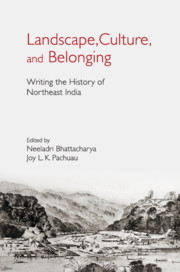Introduction
Published online by Cambridge University Press: 26 April 2019
Summary
For some time now researchers have been looking at the history of the Northeast to understand its peculiarities, uncover the stories of violence and repression that have been part of the lives of people of the region, and examine the processes through which the region was constituted. The border regions of India – like the Northeast – have been until recently neglected in the writing of Indian history, marginalized within the meta-narrative of the nation. Writing the margin into history is an effort to disrupt the self-assurance of hegemonic frames, decentre the focus of historical enquiry. It is to refigure what counts as historically significant, and what is to be considered meaningful.
What does this act of decentring really mean in the context of Indian history? For a long time, it meant that we move away from writing the history of the homogeneous national, to uncover the heterogeneity that disturbs all claims to uniformity; that we shift away from a narrow focus on the core zones, the key areas of progress and development, to the backward regions, from the centres to the peripheries. But we cannot do this simply by integrating the history of the region within the story of the nation, giving the region a voice. For this can reaffirm the certainties of the master frame, creating a space for the region within the master narrative of the nation, without disturbing that narrative. To be meaningful the act of recovery has to demonstrate the historical process through which a region is peripheralized and marginalized, show how the history that unfolds in the margins is often radically different from that witnessed elsewhere. In the context of the Northeast, we need to see how the region was excluded even as it was sought to be absorbed within the nation, how it was constituted as an exceptional space, one where the usual laws and codes of British India would not apply, where practices of governance would follow rules that were different from the normal. We need to examine how the Northeast comes to be historically demarcated as a frontier, as a border, and what such a spatial classification has meant for the people of the region?
- Type
- Chapter
- Information
- Landscape, Culture, and BelongingWriting the History of Northeast India, pp. 1 - 20Publisher: Cambridge University PressPrint publication year: 2019
- 2
- Cited by



